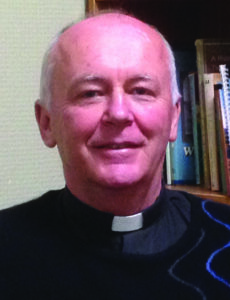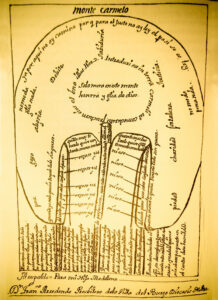St John of the Cross – Part 4 of 5

Fr Carl Telford SM
The Ascent of Mount Carmel
There are three components to the Ascent: the sketch of the Mountain, which is a drawing by St John, with explanatory notes; secondly, the poem of eight stanzas; and the commentary on the poem, which consists of three books. This was the first of his major works.
The poem was probably written either during his time in prison or after his escape from prison in August 1578, and the book was completed in about 1585.
It is a remarkable book, showing the beginnings of the spiritual journey to its completion in union with God. It is a road map to holiness. The poem is the story of love, but the work is not totally a commentary on the poem, as is the Living Flame. The Ascent is mainly concerned with spiritual theology, and is a treatise on mystical theology. It shows the path we must follow to find the Mountain top of Christ. This obscure path is a path of purification. It is experienced as emptiness and darkness that leads to light and fullness. We must be empty for God to fill us. This emptying happens by our own graced efforts – the active night -- but especially and more importantly by the grace of God – the passive night which we accept deeply as God’s leading.
The first book is a treatise on the Night of Sense, and the second and third books on Night of the Spirit. The other Nights are dealt with in the Dark Night, next month’s article.
Book One
Made up of fifteen chapters, it explains the different types of Nights, leading others through the Nights of pain and suffering to freedom and liberation. This is not a strange teaching. For example, an Olympic athlete gives up so much for a mere medal. They deny themselves. So, we must give up the hold that inordinate, unmortified desires for worldly realities have on us. A window must be cleaned of all stains if the light is to travel through it perfectly. This Night, by the death / purification, which we accept, leads to intimacy with God.
St John reminds us not to depend merely on our senses or natural desires. Its main theme is mortification in order to control the senses, and this is a ‘death’ necessary in order to enter into true spiritual life. That which is superficial dies in us -- once we let go of the excessive hold of the senses over us, we become spiritually free.
Also, if we wish to truly know God, we must give up the hold even spiritual goods have on us. For example, we may wish to be thought of as holy, but all we need is love and acceptance of God’s will for us.
We can never know the true God by our mere senses because God is infinitely greater than us and our ideas about him. This purification is really the pain of rebirth. It is a giving up of the limited certainty of what we know by the senses, being led by a new divine way, the way of faith.
In Chapter 13, St John gives a summary of our attitude to this purification. It involves being dispossessed of merely human knowing in order to know in this new way.
Read and re-read the first 13 Chapters of the Ascent, which are, perhaps, the most helpful chapters St John, doctor of the soul, ever wrote, according to Professor E Allision Peers, one of the great writers about St John of the Cross.

St John’s drawing of Mount Carmel
Book Two
Made up of thirty-two chapters, it is a treatise on the Night of the Spirit, deeper and more searching than the Night of the Senses. We must give up the hold that even spiritual possessions such as spiritual favours, have on us.
St John begins by explaining that the means to union with God is by faith. He calls this second Book ‘A treatise on faith.’ It can seem a dark obscure night, because we are not in control. But, mysteriously, we come to know God in a new way by God’s leading. We are given a new supernatural way of knowing God. The more we believe and cling to God by faith the more we know him.
We must give up any disordered desires for spiritual experiences. We like to cling to such experiences to make us feel better. By blinding our natural mode of knowing we come to supernatural illumination. It is a very painful letting go of being in charge and letting God take us to this new place. We do not understand God, but will come to know him in this new deeper way by faith. Mere human knowing will not lead us to know God in this intimacy.
Also important are Chapters13-15 about the signs of a call to deeper prayer and the need to let go of discursive active meditation in favour of a simpler form of prayer.
Chapter 22 is the most important and memorable Chapter in this book. In one memorable extract St John writes, “In giving us his Son, his only Word, [for he possesses no other] he spoke everything to us at once in this sole Word -- and he has no more to say.” Much to ponder. In Christ, we have all we need to know but are distracted from this single-minded quest by the world and the flesh. Professor E Allison Peers is of the opinion that Book Two has never been surpassed in spiritual wisdom.
Book Three
Made up of forty-five chapters, this Book is divided into two sections: Chapters 1-15 on the virtue of hope and Chapters 16-45 on the virtue of charity.
St John speaks of the theological virtue of hope and its place in the purification of our memory. We love to find our importance by reflecting excessively on the things of this world, especially spiritual things. We are not what we possess! But our aim should be to cling to God in silence. We render our memory mute and silent, since that leads to peace of soul. We place all our hope in God Himself, not in the things of God, even religious things. No worldly achievement, spiritual talent, supernatural gift or any person can or should hold our heart. Our heart is God’s alone. We gaze upon God and God gazes on us and we are content. We are lifted above worldly things. That is the work of a life time!
The theological virtue of charity means that we find in God our true desire.
We can be lead astray to love our own satisfaction and are attached to our own comfort. But St John is a sure safe guide to help us avoid this danger. Once we seek God first with our will, we are at deep interior peace. God is our wealth. We truly desire nothing except God. It is a supernatural bond with God himself that transcends our own desires.
Suddenly, St John breaks off his writing in Chapter 45, with an incomplete sentence, the end of The Ascent. Why? We do not know, but perhaps like St Thomas Aquinas at the end of his life, St John saw his writings as so much straw compared to the eternal vision and possession of God.
St John of the Cross, pray for us.
 Entries(RSS)
Entries(RSS)